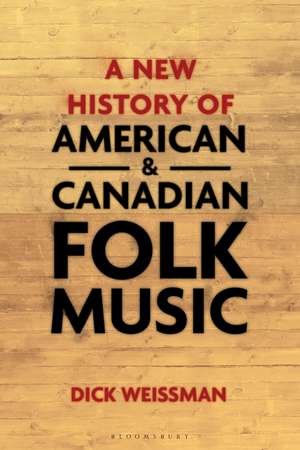A New History of American and Canadian Folk Music
Autor Prof Dick Weissmanen Limba Engleză Paperback – 4 sep 2019
| Toate formatele și edițiile | Preț | Express |
|---|---|---|
| Paperback (1) | 189.47 lei 22-36 zile | |
| Bloomsbury Publishing – 4 sep 2019 | 189.47 lei 22-36 zile | |
| Hardback (1) | 775.58 lei 43-57 zile | |
| Bloomsbury Publishing – 4 sep 2019 | 775.58 lei 43-57 zile |
Preț: 189.47 lei
Preț vechi: 230.12 lei
-18% Nou
Puncte Express: 284
Preț estimativ în valută:
36.25€ • 37.95$ • 29.100£
36.25€ • 37.95$ • 29.100£
Carte disponibilă
Livrare economică 17-31 martie
Preluare comenzi: 021 569.72.76
Specificații
ISBN-13: 9781501344145
ISBN-10: 1501344145
Pagini: 344
Dimensiuni: 152 x 229 x 20 mm
Greutate: 0.57 kg
Editura: Bloomsbury Publishing
Colecția Bloomsbury Academic
Locul publicării:New York, United States
ISBN-10: 1501344145
Pagini: 344
Dimensiuni: 152 x 229 x 20 mm
Greutate: 0.57 kg
Editura: Bloomsbury Publishing
Colecția Bloomsbury Academic
Locul publicării:New York, United States
Caracteristici
A follow-up to Weissman's bestselling 2006 book, Which Side Are You on?, that incorporates recent developments within the genre and industry
Notă biografică
Dick Weissman is Associate Professor Emeritus at the University of Colorado at Denver, USA, and has been involved with the North American folk revival as a musician, performer, composer and scholar. He is the author of many critically acclaimed books about American roots music and the music industry, including The Folk Music Sourcebook (1989), which won the Deems Taylor ASCAP Music Critics Award; The Music Business (5th edition 2003), which sold over 100,000 copies; Navigating the Music Industry (2003); Which Side Are You On?: An Inside History of the Folk Music Revival in America (Bloomsbury, 2006); and Songwriting: The Words, the Music, and the Money (2010).
Cuprins
PrefaceAcknowledgementsIntroduction: A New Look at American and Canadian Folk Music1 From the Beginning: Folksong Collectors and Collections and Regional Music Styles in the United States and Canada2 Mass Distribution: Radio, Records and Pre-World War Two Artists3 Early Protest Music: The Industrial Workers of the World, the Coal Miners, the Cotton Mills and Communist and Socialist Agitators4 The Almanac Singers, People's Songs, People's Artists and the Blacklist5 The Weavers and the Beginning of the Folk Revival6 Meanwhile, Back in Canada7 Selling the Music: The New York Scene 8 Beyond the Big Apple: Coffeehouses, Folk Music Organizations and Folk Music Instrument Shops in Boston, Chicago, Denver, Los Angeles, Philadelphia, the Pacific Northwest, San Francisco and Toronto9 The Riddle of Authenticity: The Civil Rights Movement and Folk Music 10 Folk-Rock and the British Invasion Decimate the Pop-Folk World: And Singer-Songwriters Move In11 How the Singer-Songwriters Evolved from the Pop-Folk Revival and the Women's Music Movement Emerged from the Feminist Movement12 North American Folk Festivals and Summer Teaching Camps13 Instrumental Music: Development and Expansion of Musical Possibilities the Folk Music Business14 What's Going On: Expansion, Contraction and Evolution15 Looking Back: An Evaluation of Four Major Figures in the Folk Revival16 Today and TomorrowNotesAppendixIndex
Recenzii
A renowned and prolific writer on folk music, Weissman (emer., Univ. of Colorado, Denver) expands on his earlier book, Which Side Are You On?: An Inside History of the Folk Music Revival in America (CH, Mar'06, 43-3956), by providing an updated chronicle of American and Canadian folk music from the early days of folk-song collecting in the 18th century to the present ... Anecdotal as well as scholarly, this book is appropriate for both fans and researchers. Summing Up: Highly recommended. All readers.
Few insiders from the Folk movement of the 1950s/60s have been as prolific as Dick Weissman. This overview is scholarly, amiable, and anecdotal: he sheds light on the well-known and lesser known music types with his first-person experiences. He delivers an excellent study of styles and personalities that shaped this special genre of American and Canadian music.
Dick Weissman was in the room at the dawn of the US-Canadian folk revival of the 1960s. As a musician, songwriter, and recording artist, he is uniquely placed to reflect on North American folk music as practice, cultural movement, and commercial industry. Also a professor and teacher, he is able to offer the wider historical overview. His New History is at once informed and idiosyncratic, scholarly and personal. It is sure to become a major source for future historians and lay readers alike.
Few insiders from the Folk movement of the 1950s/60s have been as prolific as Dick Weissman. This overview is scholarly, amiable, and anecdotal: he sheds light on the well-known and lesser known music types with his first-person experiences. He delivers an excellent study of styles and personalities that shaped this special genre of American and Canadian music.
Dick Weissman was in the room at the dawn of the US-Canadian folk revival of the 1960s. As a musician, songwriter, and recording artist, he is uniquely placed to reflect on North American folk music as practice, cultural movement, and commercial industry. Also a professor and teacher, he is able to offer the wider historical overview. His New History is at once informed and idiosyncratic, scholarly and personal. It is sure to become a major source for future historians and lay readers alike.
